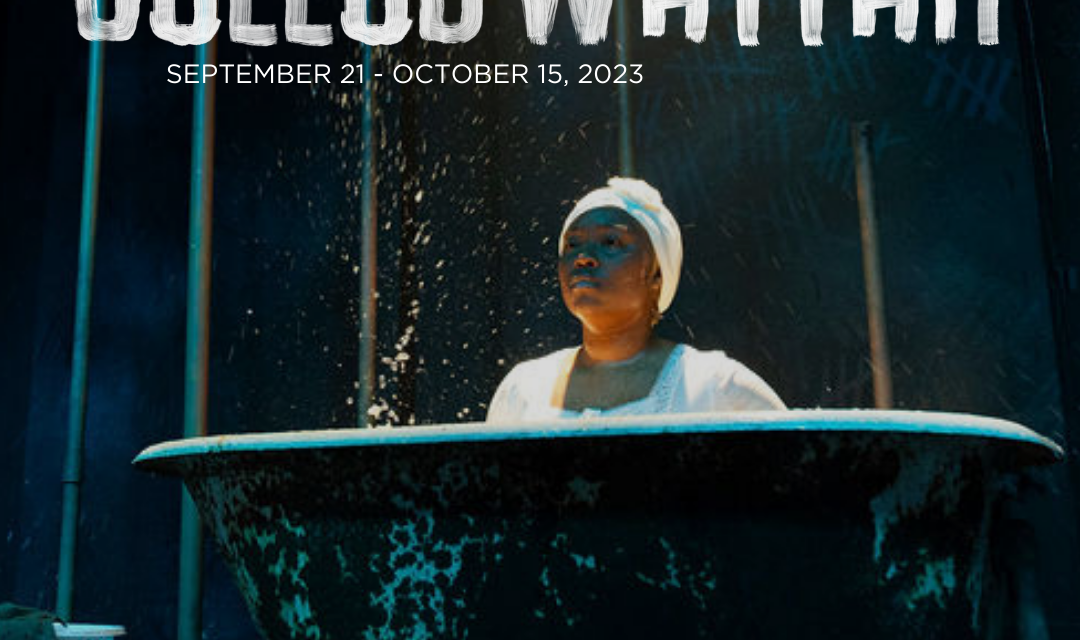
(Courtesy of Actor’s Express)
Performing historical and present social justice battles is no easy task, but Actor’s Express Theater Company did so stunningly. “Cullud Wattah” displays the trauma of the Flint water crisis over three generations of Black women. The theater is showing this beautiful production through Oct. 15, which touches on spirituality, sexuality, financial crisis, identity, class, race and, most importantly, family.
The storyline follows the home of five women. Big Ma (Terry Henry) has been physically debilitated due to the status of the water and lives with her daughters Ainee (Parris Sarter) and Marion (Marita A. McKee). Ainee is carrying her seventh child, her first that has come to term. Marion faces a moral dilemma after General Motors, one of the companies responsible for the water contamination, employed her. The two youngest of the family are Reesee (Kerrie Garrett) and Plum (Morgan Crumbly), an eight-year-old struggling with leukemia.
Immediately after walking into the lobby, I could sense the communal and participatory aspects of the performance. The lobby had a display of plastic water bottles, creating a sea of brown and yellow, as the liquid represented the status of the water each day in Flint (Mich.) during the crisis. Front-of-house staff graciously explained the importance of this factor and how each bottle was labeled for a day Flint has gone without clean water. Audience members were encouraged to add a bottle to the stage upon entry, customizing the set each night and displaying the actors’ ability to adapt to the new environment.
The stage was unlike anything I had seen and was altered specifically for the show. It was placed in the center of the room, with audience seating on either side, and split into four sections, each representing a different room in the family’s home. The set created a relationship between the audience and the performance, differing from the proscenium stages seen in a typical Broadway production. It provided different perspectives and visuals for varying positions in the audience. No one saw the exact same show, and no one saw everything onstage.
The show itself was extremely technical and well done. The lighting perfectly captured the various moods and displayed aspects of the show that would not have otherwise been visible. Additionally, water played a large part in the performance. A bathtub of water adorned the stage throughout the production and was a major part of the storyline, with the stage crew constantly cleaning and replenishing it.
All of the actors gave breathtaking performances and truly embodied their characters, sliding into their roles of storytellers for the people of Flint. Each cast member connected their own experiences to their roles, bringing life to the stage.
The show was especially personal for Henry, who has family that still lives in the city. In a Q&A after their opening show on September 24, Henry said that she “packed up [her] bags … but these people are still here.”
The ending of the show was also very powerful because of director Amanda Washington’s choice to eliminate a traditional curtain call. Instead, cast members highlighted examples of unclean water throughout the country, including in Atlanta.
After the performance, the cast and production team how they decompressed after such an emotionally-driven performance.
“It’s easy to lean into the sadness of it, lean into the hopelessness of it,” Crumbly said. “But when you find the joy, there’s a lot of laughter in the show.”
It also became clear that community played a major role both on and offstage as Sarter said that the actors are “there for each other,” supporting each other backstage and “finding the light of that balance.”
The actors also explained how their love of theater feeds into being able to perform in shows that discuss heavy topics.
“It’s not about the applause, but it really is about taking the information that you have received and deciding what you’re going to do with that,” McKee said.
“Cullud Wattah” includes something for everyone. With a diversity of characters and individual dilemmas, it creates an atmosphere of acceptance and support. Everyone has a value in the show, and the audience is left with more compassion for the people of Flint and a desire for change.
Skye McConaughy (he/him) (25Ox, 27C) is from Glenwood Springs, Colorado, majoring in biology and psychology on a pre-med track. Outside of the Wheel, he is a member of the Student Activities Committee, the Student Government Association's First-Year Council, and stage managing Oxford's fall play. He hopes to continue his passion for visual and performing arts and collect avid photos of Oxford squirrels.







